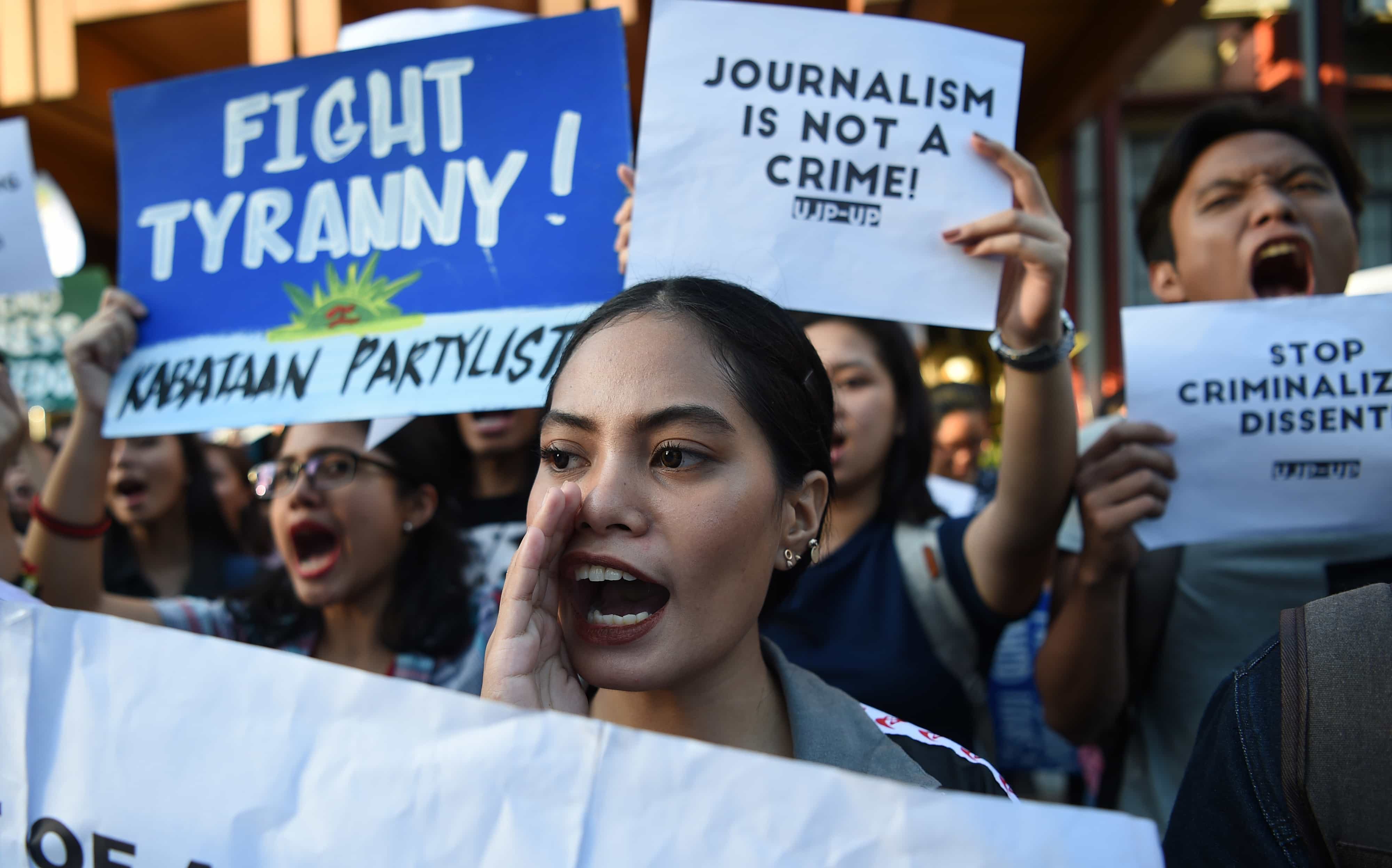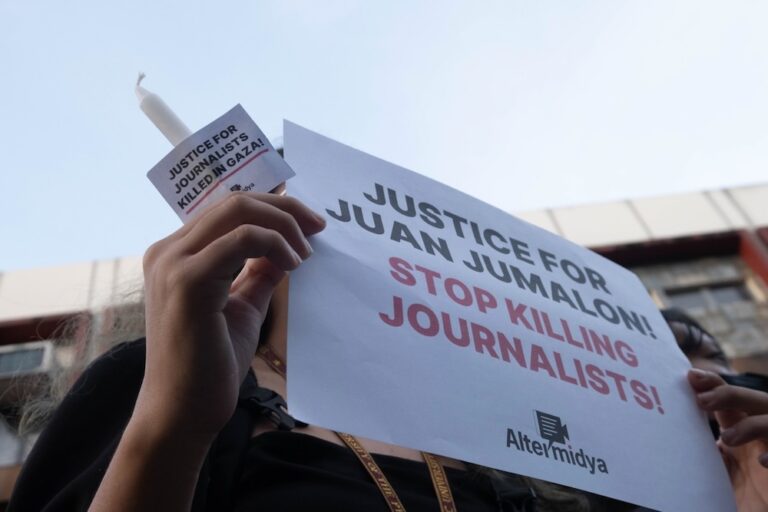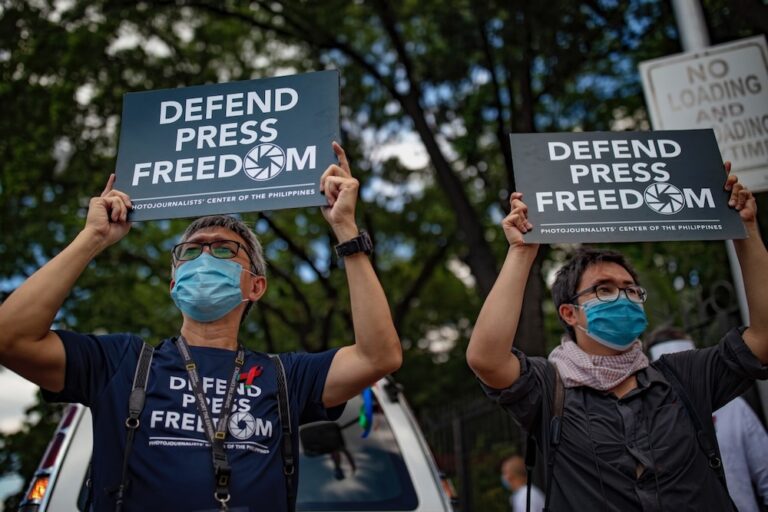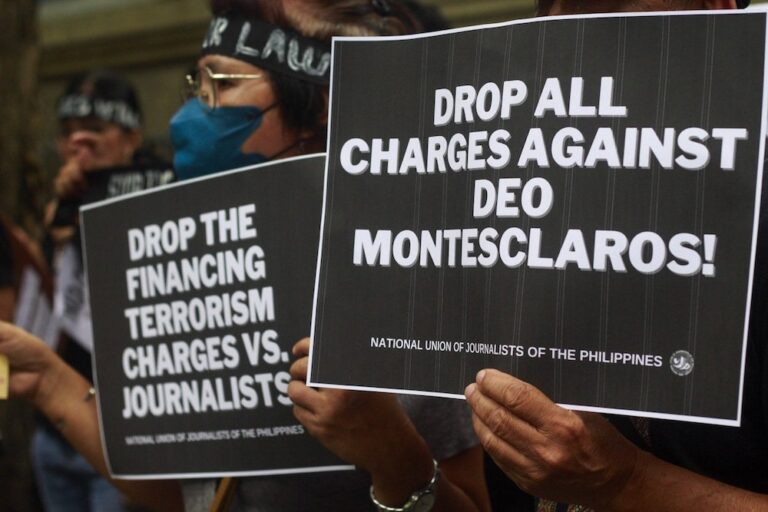Rappler CEO and Executive Editor Maria Ressa was arrested on 13 February 2019 for cyber libel regarding an article that was published in May 2012, four months before the Philippine Cyber Crime Prevention Act was signed into law. She was released after posting bail on 14 February.
“When I look back a decade from now, I want to make sure that I have done all I can. We will not duck. We will not hide. We will hold the line.”
These were the defiant words of Rappler CEO and Executive Editor Maria Ressa after spending a night in detention. She was arrested on 13 February 2019 for cyber libel and was only allowed to post bail the following day.
“My stay last night at the National Bureau of Investigation really made me think, what is this all about? It’s about abuse of power and the weaponization of the law. This is not just about me, not just about Rappler,” she added.
Ressa was charged with cyber libel for a Rappler story about the alleged links between businessman Wilfredo Keng and former Supreme Court Chief Justice Renato Corona who was facing an impeachment trial in 2012. It was published in May 2012, four months before the Philippine Cyber Crime Prevention Act was signed into law.
The complaint was filed by Keng in 2017, a year after President Rodrigo Duterte came to power and five years after the publication of the alleged libelous article. The NBI initially dismissed the complaint but retracted its decision and proceeded to file a case against Ressa, even though she was not the editor of Rappler in 2012. Rappler argued that it hadn’t violated any ethical standards, since it included the sides of all parties mentioned in the news article.
The case prospered in the court, and a warrant of arrest was issued against Ressa on 12 February 2018. National Bureau of Investigation (NBI) agents arrived at Rappler’s office late in the afternoon the following day – timing that preventing Ressa from being able to post bail during office hours. A night court judge refused to grant Ressa’s bail petition, forcing her to remain in detention at NBI headquarters.
Ressa posted a bail of PHP100,000 (USD1,917) on 14 February, and the court subsequently issued a release order. This was Ressa’s sixth time posting bail, since she is also facing five tax evasion cases, which many believe are politically-motivated.
She’s free! @mariaressa #DefendPressFreedom @rapplerdotcom pic.twitter.com/LWK9xyrBQR
— Glenda Gloria (@glendamgloria) February 14, 2019
Finally out. Thank you for your support! #HoldTheLine pic.twitter.com/EOHTmx0i12
— Maria Ressa (@mariaressa) February 14, 2019
Actions against Rappler have been going on for a while. In early 2018, its incorporation papers were revoked by the Philippine government. Its reporters were barred from entering the presidential palace and covering the activities of the president. Duterte himself has several times accused Rappler of publishing fake news.
Rappler‘s legal woes are linked to its critical coverage of the policies and programs of the Duterte government, especially its investigative reports about the human rights abuses in the implementation of the bloody war against illegal drugs.
Ressa’s arrest generated widespread outrage in and out of the Philippines. The National Union of Journalists of the Philippines described the arrest as a “shameless act of persecution by a bully government.”
“This government, led by a man who has proven averse to criticism and dissent, now proves it will go to ridiculous lengths to forcibly silence a critical media and stifle free expression and thought,” the group said in a statement.
The Center for Media Freedom and Responsibility warned that Ressa’s arrest is an attack against the Philippine press: “An attack on the freedom of one journalist or one news organization weakens the capacity of the entire institution to report the truth and is an attack on all of us and on democracy itself.”
Journalists, artists and youth rally behind @rapplerdotcom CEO and Executive Editor Maria Ressa who was arrested earlier this evening for cyber libel. CMFR joins the call to#DefendPressFreedom. pic.twitter.com/NntiZPaqJQ
— CMFR (@cmfr) February 13, 2019
Prominent leaders of the opposition, university presidents, and some diplomats publicly expressed support for Ressa. They were joined by journalists and several media personalities outside the Philippines who were one in condemning the detention of Ressa.
The Southeast Asian Press Alliance (SEAPA) said the arrest “belies all pretense of upholding press freedom by an administration that has from the get-go shown its abhorrence of an independent and critical press.”
Indonesia’s Aliansi Jurnalis Independen released a statement urging the Philippine government “to respect democracy, protect the freedom of the press by stopping all kinds of intimidation and drop all charges against Ressa.”
“Actions like this week’s baseless arrest of Maria Ressa, an award-winning investigative journalist and CEO of the independent Philippines news website Rappler, must be strongly challenged by all who value human rights, press freedom, and our essential right to access information in the public interest. The global IFEX free expression network is watching – and ready to take action,” said Elizabeth Rivera Rivas, IFEX Communications Director.
David Kaye, the United Nation’s Special Rapporteur on freedom of opinion & expression praised Ressa as “one of the great global journalists/entrepreneurs and an advocate for and friend to free press everywhere.”
#DefendPressFreedom#StandwithMaria#StandwithRappler#ResistTyranny @thegreenmurphy @withMEAA @IFJGlobal @rapplerdotcom @nujp pic.twitter.com/XLhHiJnV8H
— MEAA (@withMEAA) February 14, 2019
Christophe Deloire, secretary-general of Reporters Without Borders, alluded to the digging up of an old case that was previously dismissed and referred to it as “absolutely absurd and confirms that this is not justice but an attempt to gag a media outlet and editor.”
The International Federation of Journalists criticized the arrest as “a very serious threat to media freedom and journalists’ safety.” The Committee to Protect Journalists said the legal harassment of Rappler and Ressa “has now reached a critical and alarming juncture.” The International Press Institute deplored the manner in which Ressa has been pursued by the government and called it a “gross and willful violation of press freedom.”
Rappler stood its ground and vowed to remain true to its commitment to defend an independent media.
“If this is another of several attempts to intimidate us, it will not succeed, as past attempts have shown. Maria Ressa and Rappler will continue to do our jobs as journalists. We will continue to tell the truth and report what we see and hear. We are first and foremost journalists, we are truthtellers.”



